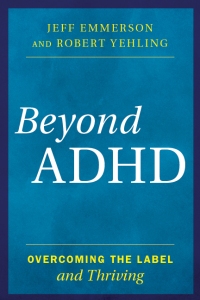(Part 2 of a 2-Part Series)
(EDITOR’S NOTE: Beyond ADHD, the highly anticipated book by Jeff Emmerson and Robert Yehling, will release worldwide from Rowman-Littlefield Publishers on August 16. Pre-ordering is available now.)
Happiness and excitement filled our hearts as we drove across the 401 highway in Ontario, Canada, destined for the U.S. border. Our happiness was borne by the anticipation of the answers I might receive at our destination, answers that would explain and perhaps present new directions in a life I’d had such a hard time understanding, right down to my ADHD diagnosis five years before
— From Beyond ADHD, by Jeff Emmerson and Robert Yehling
 Jeff Emmerson’s revolutionary look at the ADHD diagnosing and prescribing epidemic, Beyond ADHD, breaks down into two parts: the current environment and pressures that are causing so much diagnosing and prescribing; and looking ahead into much more helpful, progressive, and successful ways of working with those dealing with attention issues.
Jeff Emmerson’s revolutionary look at the ADHD diagnosing and prescribing epidemic, Beyond ADHD, breaks down into two parts: the current environment and pressures that are causing so much diagnosing and prescribing; and looking ahead into much more helpful, progressive, and successful ways of working with those dealing with attention issues.
In this segment of our interview, Jeff gives us a peek into Part II, and how things might look if we utilized fitness, diet, further education, behavioral therapy and other approaches — approaches that, frankly, feed the whole person — rather than the current prescribe-first mentality.
Word Journeys: One of your biggest supporters of this book is Dr. Allen Frances, the former chair of John Hopkins Medical School and esteemed chair of the DSM-IV committee, which sets diagnosis and prescription guidelines for more than 300 defined mental health issues. What did Dr. Frances tell you that further inspired you to address these issues?
Emmerson: When I discovered his stance on ADHD, current diagnosing standards and his beliefs about the big-picture of what it is to be “normal” these days, I was immediately refreshed (if surprised at the same time). He confirmed my fears early on when he spoke about true ADHD diagnosis prevalence being around 4 percent in American children. Considering he was the Chair of the DSM-IV task force, this was very, very believable. After all, it would be only too easy for him (of all people) to “toe the party line,” but no – he told the truth, even when it wasn’t convenient. He also speaks adamantly about the current opioid crisis and many other topics in healthcare that are severely lacking, ones we need to address with courage, honesty and the desire to get ahead of them before epidemics come forth any more then the opioid one already has, frankly. ADHD may well be on the same path in its own way.
 Word Journeys: Another big supporter of alternative approaches, and Beyond ADHD, is Dr. Marianne Kuzujanakis, director of the SENG Institute for Gifted Children. Can you speak to how focusing on a child’s or adult’s gifts, and their natural hunter-gatherer minds, actually takes us beyond the ADHD mindset?
Word Journeys: Another big supporter of alternative approaches, and Beyond ADHD, is Dr. Marianne Kuzujanakis, director of the SENG Institute for Gifted Children. Can you speak to how focusing on a child’s or adult’s gifts, and their natural hunter-gatherer minds, actually takes us beyond the ADHD mindset?
Emmerson: It’s funny what we can achieve when three key things (are allowed to) happen:
- Our natural abilities are uncovered, focused on and supported;
- We’re taught to have a “growth-mindset” that teaches self-resilience and focusing on lessons to be learned from every “failure or mistake;” and
- Different learners or personalities from the “norm” are empowered in environments that focus on strengths and don’t force them to learn in areas that they may have zero interest in (those not needed for day to day life).
Self-worth, confidence, positive morale toward society, and inspiration toward imagination and self-growth need to be taught and nurtured in education systems more than ever. A new day has arrived. We need to buy into the medical model for being “different” and focus instead upon the unique abilities and passions that each of us have within. This cookie-cutter approach to education (at the cost of any alternatives for many millions of us) simply doesn’t cut it, and it’s showing in a number of ways in a profoundly “sick” society.
Word Journeys: What role has Big Pharma played in the increase in ADHD diagnoses?
Jeff Emmerson: An immense one, more than many of us might realize. From suggestive advertising to Americans and those in New Zealand via television to funding healthcare providers, offering incentives to drug reps and physicians to advertising in more subtle ways through online media outlets, and through heavily influencing research findings, they pretty much have their hands in everything, not to mention the U.S. government, in a huge way. While medications definitely help some live better lives, there are billions of dollars changing hands, so following the money to understand its potential influence is of crucial importance.
Word Journeys: A growing number of people think ADHD is a catch-basin, not really an affliction, but more a convenient label for what could be a hundred different things. What is your opinion of that?
Emmerson: I get where they’re coming from! Let’s use some common sense for a moment. I believe that the diagnosis does help some in a wonderful way; I know it does, in fact. I’ve been told tons of stories from others, and I’m all for whatever empowers and helps people learn more about themselves and tools toward self-worth, resilience and most of all, self-awareness. However, the pendulum has swung way too far in favor of rushed, ill-informed ADHD diagnoses to put a band-aid on issues we simply aren’t equipped to address at their deeper cores.
Once I discovered how easily I was wrongly diagnosed with ADHD, my world was never the same again. I saw the elephant in the room where ADHD is concerned: What it is; how to diagnose it (as a diagnosis of exclusion since nearly one hundred other true root causes mimic it); and how to treat it/see it in society. I could NOT, in good conscience, let this newfound awareness go. My soul screamed to bring it to the world through building the largest online community I humanly could.
Word Journeys: You combined your personal stories with the pressing issues in Beyond ADHD. What did you learn about your own journey while weaving your stories into the material?
Emmerson: First of all, I quickly realized that I’m far from alone in living with these symptoms. Beyond that, I’m both humbled and fiercely driven from all the learning I’ve done over the last four years or so. I now have three or four additional book topics in mind for future projects (based in mental health and current society) that I know are needed desperately by millions of people going through challenges in this realm (including those who care for them in any number of capacities).
I also learned (and confirmed to myself) that even if life seems lost, even if the conventional road to what society calls success doesn’t work and we make mistakes that seem insurmountable (with the shame that often comes with them), we CAN completely turn things around with the right support, shift in mindset and faith/resilience. Man, that’s the most humbling part of it all for me – that and seeing others who have been somehow touched by my efforts. I now want others to feel the way I do. I’m more at peace than I’ve ever been. Everything from here on in is icing on the cake.
Word Journeys: If you could envision a society beyond the current ADHD protocols, what would it look like?
Emmerson: We’d re-evaluate current education, healthcare, food, water, industry, parenting and other social support structures/initiatives in society. Then, I’d look beyond labeling in psychiatry/psychology and look at ways to evolve through a strengths-based approach, entrenched in a solid foundation from as young as possible. From there, massive investment into the collective well-being of society would be made in forms we deem most important from both macro and micro perspectives while ensuring minimal waste of said investments to ensure well-targeted and efficient service to society. It would be tracked and watched to constantly be improved upon as time passes and the world evolves/encounters challenges. That would be a good start.
As we know, it’s much easier to raise a healthy, equipped child by investing in their upbringing than it is to try and mend a distressed or “damaged” adult human being. We should always be mindful of that — from the moment we become parents, educators or healthcare providers.



